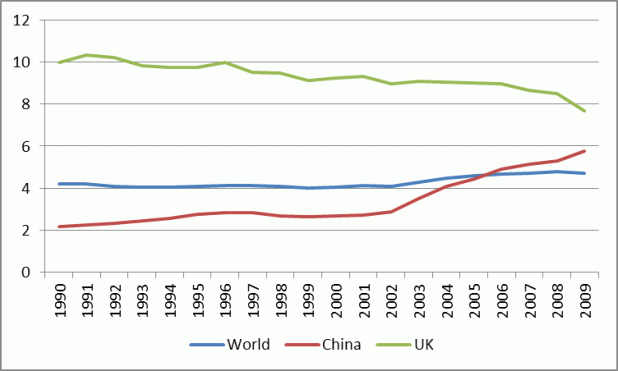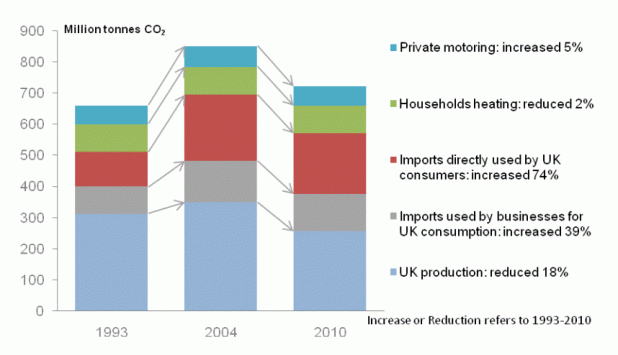A piece in the Times (£) by Alice Thomson is the perfect illustration of how people’s horizons and thoughts about what can be achieved in politics are shaped by the political institutions under which they live.
People’s concern about the environment is expressed by their involvement in bee-keeping – the number of beekeepers in the UK has doubled in the last ten years – and preserving local woodland. They are no longer concerned about climate change, she writes, because there is nothing they can do:
Since 1990 emissions have increased by half, despite Britain’s best efforts to drop a carbon footprint shoe size, because emerging countries are busy increasing theirs.
And at first sight, that’s how it looks.

Since 1990, per capita UK emissions have fallen while those of the rest of the world have risen. Comparing one country against another shows that we are doing our bit but the others aren’t.
But look more closely. The carbon emissions we are responsible for are not simply those that take place within our territory but those that take place on our behalf. If carbon-intensive manufacturing industry moves from the UK to China, but British consumers still buy the resulting production, then the carbon emissions are still, in a sense, British.
Calculating emissions on this basis, so-called “embedded” emissions, tells a different story. Far from being sufficient as Alice Thomson fondly imagines, British efforts to reduce carbon emissions are barely making a dent.

There has been a decline in the carbon emissions caused by heating our homes, and a bigger decline in the carbon emissions produced by British industry (thanks to the big decline in British industry itself). Imported emissions, by contrast, have soared. British consumers have merrily increased the demands they make of foreign companies – the crucial decisions about lifestyles are still keeping carbon emissions high.
Reporting data strictly country by country, as though there is no connection between them, shapes our thinking to persuade us, wrongly, that we are already doing enough.
Leaving the key decisions in the hands of national government also tells us that, even if we wanted to do more, there is nothing more we can do. In this light, cultivating bees and protecting neighbourhood forests are the hallmarks of an environmentalist.
If something can’t be done by national governments acting independently, it cannot be done at all. This is politics as the art of the possible.
But, if we refuse to accept that our responsibility to the environment stops at our own national borders, and if we reject the notion that national governments are the last word in environmental decision-making, then a different prospect appears.
Far from believing that we need not and cannot do anything to fight climate change, instead we need to create the new political institutions that can do so if national governments cannot.
We do not need to feel helpless in the face of the biggest environmental threat, and should not be distracted by worrying about smaller ones instead. Federalists think of politics as the art of making possible whatever is necessary. The institutional innovations needed to fight climate change are certainly necessary, and therefore we must make them possible. That is what the best efforts to fight climate change would actually encompass.

I’ve often stated that the climate change arguement, reminds me of a story by Hans Christian Andersen, called “The Emperor’s New Clothes”. In this story, if you’re not familiar with it, there are two swindlers that manage to convince the Emperor, that they can make the finest woven material that is so light and fine it’s invisible, but only the wisest are able to see it. As a matter of fact it is invisible to anyone who is too ignorant and incompetent to appreciate its quality.”
Everyone was convinced that if they couldn’t see the material, they must be either ignorant or incompetant. Not wishing others to believe they were ignorant or incompetant they continued the charade regardless.
The 2 swndlers made great play in acting out making the cloth and darning the clothing for the Emperor. The Emperor himself could not see the fabric, but thought that others wouldn’t know except the ignorant and incompetant.
Your Majesty,” the prime minister said, “we have a request for you. The
people have found out about this extraordinary fabric and they are anxious to
see you in your new suit.” The Emperor was doubtful showing himself naked to
the people, but then he abandoned his fears. After all, no one would know
about it except the ignorant and the incompetent.
“All right,” he said. “I will grant the people this privilege.” He summoned
his carriage and the ceremonial parade was formed. A group of dignitaries
walked at the very front of the procession and anxiously scrutinized the faces
of the people in the street. All the people had gathered in the main square,
pushing and shoving to get a better look. An applause welcomed the regal
procession. Everyone wanted to know how stupid or incompetent his or her
neighbour was, but as the Emperor passed, a strange murmur rose from the
crowd.
Everyone said, loud enough for the others to hear: “Look at the Emperor’s
new clothes. They’re beautiful!”
“What a marvellous train!”
“And the colors! The colors of that beautiful fabric! I have never seen
anything like it in my life!” They all tried to conceal their disappointment
at not being able to see the clothes, and since nobody was willing to admit
his own stupidity and incompetence, they all behaved as the two scoundrels had
predicted.
A child, however, who had no important job and could only see things as his
eyes showed them to him, went up to the carriage.
“The Emperor is naked,” he said.
“Fool!” his father reprimanded, running after him. “Don’t talk nonsense!”
He grabbed his child and took him away. But the boy’s remark, which had been
heard by the bystanders, was repeated over and over again until everyone cried:
“The boy is right! The Emperor is naked! It’s true!”
You could almost transpose the whole climate change story with this one, where the Emperor is the EU, the 2 swindlers are the IPCC and climate change scientist and the clothes are the manmade Climate Change theory. Politicians and scientists will grasp this theory with both hands,for it gives them a reason to tax us and, for fear of appearing ignorant and incompetant. it’s gone on too long to change. What it needs is more people to shout “The Emperor is Naked!!” and eventually enough people will listen for to expose it, for the the scam it is.
The EU solution is to tax the fuel in various “green Levies” of different names and by different methods, mostly in a stealthy way. The effect has been an enormous rise in domestic fuel bills, but more importantly has caused the price of electricity to large industries to rocket, making them uncompetitive with the rest of the world. In the Chart you may notice China has increased the number of coal fired power stations, but at the same time UK power stations have closed, as a direct result of these green taxes. The result has decimated what industry we have left after 40 years of EU regulations, and there is great risk of Electricity blackouts in the Winter of 2014, probably February if we get a particalary cold spell, but almost certainly a year later.
All this in persuit of an idea that global warming…climate change is man made, when this is an entirely natural process, that has been changing for billions of years.